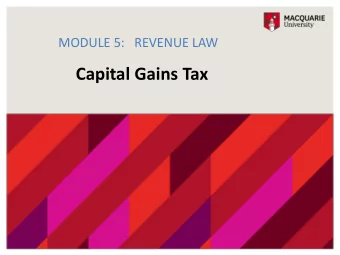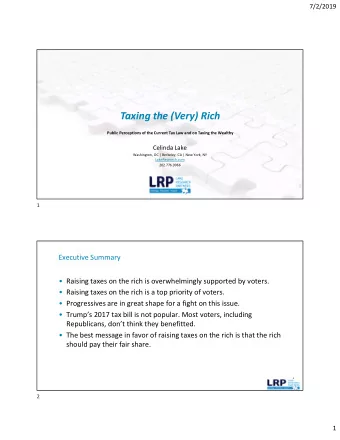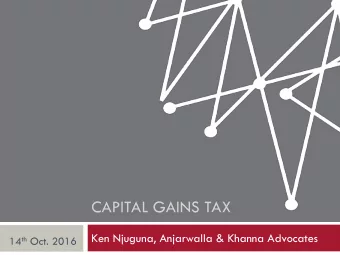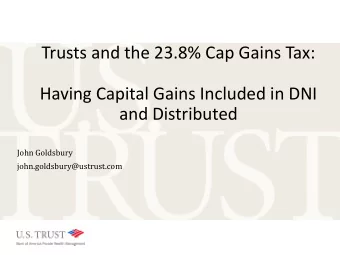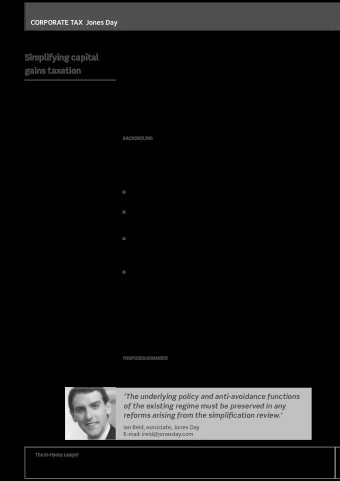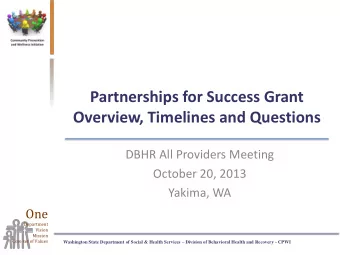
Taxing Capital Gains in New Zealand: Assessment and Recommendations - PowerPoint PPT Presentation
Taxing Capital Gains in New Zealand: Assessment and Recommendations Leonard Burman Syracuse University David White Victoria University of Wellington CAGTR Business Links Seminar Wellington, New Zealand 17 September 2009 Current Ad Hoc,
Taxing Capital Gains in New Zealand: Assessment and Recommendations Leonard Burman Syracuse University David White Victoria University of Wellington CAGTR Business Links Seminar Wellington, New Zealand 17 September 2009
Current Ad Hoc, Incoherent, Hybrid Capital Gains Tax Regime � At least 25 kinds of assets and transactions are taxable—some on realisation, some on accrual, others based on imputed return � Shares: taxation depends on intent and whether listed or unlisted, domestic or foreign � Land: depends on intent at time of purchase (and many other rules) � Ever evolving case law based on unclear and sometimes inappropriate precedents
Current system is inefficient � Distorts saving and investment decisions � Encourages tax shelters � Adds unnecessary uncertainty � Reduces tax base, requiring higher rates
Inequitable � People with equal wealth and economic income can face very different tax burdens � 38% tax for some, 0% for others � Exempt assets disproportionately held by the wealthy (undermines progressivity)
Distribution of Assets and Family Income, 2006-07 100% Family income Owner occupied housing Taxable assets excl own ‐ occ property 80% Cumulative % of assets 60% 40% 20% 0% 0% 20% 40% 60% 80% 100% Cumulative % of households
Complex � Determining boundary between capital (untaxed) and revenue can be mystifying (even to judges) � Different taxation regimes for different asset classes/ transactions � Difficult for tax authorities to enforce
Arguments for Capital Gains Tax Relief The CGT creates a “lock-in effect” � The CGT discourages risk-taking � The CGT double-taxes savings � Capital gains are eroded by inflation � The CGT is a double tax on company � stock
Lock-In Effect � Realisation-based tax creates strong incentive to hold assets � There’s way more selling than one would expect, suggesting that the economic cost from lock-in might not be that great � “Angel of death loophole” is a big factor in US (and not recommended design feature in NZ) � CGT preference reduces lock-in, but accrual taxation would eliminate it
Individual & Corporate Capital Gains in the US, 1955-1999, in billions of $1999 600 200 500 In d ivid u al (so lid ) C o rp o rate (d ash ed ) 150 400 Correlation = 0.97 300 100 200 50 100 0 0 1955 1960 1965 1970 1975 1980 1985 1990 1995
Accrual Taxation and Risk � Let R= r+ p+ e � r = riskless rate � p = risk premium � e = random component (risky part) � Investor is indifferent between asset paying r with certainty and R with risk � That is, p just compensates the investor for assuming the risk of e � Expected utility of p+ e is zero � Thus tax on p+ e incurs no economic burden
Realisation based tax a mixed bag for risky assets � Deferral lowers effective tax rate, especially for assets with high expected R � Loss limits reduce expected after-tax returns for risky investments relative to others � Evidence from US (Poterba, ABS) � loss limits not much of a constraint � (probably more binding now) � (Is there not enough risk taking?)
Double taxation of saving � Valid complaint, but… � It’s an argument for consumption tax, not preferential treatment of only some returns to saving � Theory of second best and tax shelters
Inflation � Inflation reduces real after-tax return on assets—can even turn it negative � But appreciating assets affected less than others (like bonds) � Indexing taxation of all capital income and expense would, in principle, make sense � However, it would complicate administration and compliance and probably not worth the cost at low inflation � Indexing capital gains without indexing capital expense is a recipe for tax shelters
Corporate double tax � New Zealand’s corporate tax is integrated with individual income tax so this is not a significant problem � If credits allowed against dividends, unused credits may be carried over and are presumably capitalised in asset values, increasing gains.
Issues with Accrual Taxation � It’s the theoretical ideal under unrealistic assumptions—and possibly impediment to real world reform � Measurement issues � Liquidity � Volatility of income tax receipts � Shifts risk from individuals to government � Automatic stabiliser
A Better Hybrid Regime � Accruals taxation for listed shares and unit trusts � Company tax allowed as credit against accrued gains � Full deductibility of losses � RFRM tax at full rate for other assets � Economically equivalent to accruals taxation, but could be very hard to explain to non- specialists
Realisation based tax � Expand capital gains net to include all capital assets � Tax assessed on sale (realisation) � This is the norm in the rest of the OECD � Losses may be deducted only against gains; net losses carried over � Evidence from US suggests that carryovers do not persist in normal times � Partial exemption for owner-occupied housing � Small property tax to offset bias in favor of homeownership
Design issues in realisation-based tax � Transition � Canadian approach—gains after “valuation date” subject to tax—diminishes lock-in problem � Exemption for small gains? � A small exemption (e.g., $500 per year) could spare most taxpayers from the tax while preserving most of the base � Disregard could also be applied for eligibility to means-tested transfers � Taxing lumpy gains � Australian approach � Holding period requirement for housing exemption � Rollovers � M&A and certain corporate restructuring allowed rollover relief � Rollover relief for real estate is a bad idea (although in place in US) � Taxation at death
Tax rate on gains � Most countries exclude a portion of gains from tax (US applies separate rate schedule, which is very complex and not recommended) � With accruals taxation, there would a strong argument for taxing gains in full on equity and efficiency grounds � Even with realisation-basis tax, full taxation simplifies administration and compliance considerably and is a good solution of individual income tax rates are not too high � USA--TRA86: top rate of 28% applied to all income � However, if lock-in and the ring fencing of losses are judged to be significant problems, they can be mitigated by excluding a portion of gains from tax � Optimal exclusion balances efficiency and equity gains from taxing gains against the efficiency costs due to lock-in, loss limits
It is extremely unlikely that the optimal CGT rate is zero
Effects of broadening the taxation of capital gains � Improves efficiency � Raises revenue � Progressive: Could offset effect of other regressive (but efficiency-enhancing) tax changes such as rate cuts, GST increase � More rational system easier for taxpayers to comprehend, comply with, and for authorities to administer � NZ tax system brought more in line with OECD norms
Conclusion � No perfect solution given real world constraints � Should not let perfect be the enemy of the good � Our judgment is that taxing capital gains more like other income would enhance efficiency and fairness
Recommend
More recommend
Explore More Topics
Stay informed with curated content and fresh updates.


